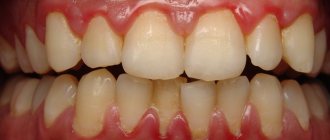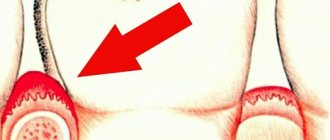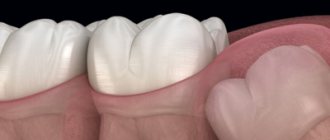From this article you will learn:
- why do gums bleed during pregnancy,
- what is pregnancy gingivitis,
- how to carry out treatment correctly.
The article was written by a dentist with more than 19 years of experience.
Inflammation of the gums during pregnancy is a process characterized by bleeding gums, as well as hypertrophy of the gingival papillae, which occurs due to an increase in the concentration of estrogen and progesterone in the blood of a pregnant woman. This condition is usually called the term “gingivitis in pregnant women”, and according to statistics, it is observed in 75% of women - for a period of 2 to 8 months. Most often, gingivitis occurs in the area of the front teeth, and it affects only the gingival margin at the necks of the teeth (including the gingival papillae).
Clinical studies show that more than half of all women with gingivitis during pregnancy already had a mild form of chronic catarrhal gingivitis at the beginning of pregnancy, which is practically asymptomatic. Thus, an increase in the content of estrogen and progesterone in most cases led to an exacerbation of pre-existing gingivitis, and was not the root cause of its development. We will tell you more about the causes of inflammation below, because... there are other factors to consider.
Chronic catarrhal gingivitis –
But pregnant women can experience not only gingivitis, but also a more serious gum disease, in which inflammation spreads from the superficial part of the gums to deeper tissues. This disease is called periodontitis, and with it there is destruction of the bone tissue around the teeth, destruction of the dental-gingival attachment, suppuration from periodontal pockets, and over time, tooth mobility also occurs. And this disease already indirectly affects the fetus, which requires mandatory treatment.
Why does gingivitis occur during pregnancy?
Tens of millions of microorganisms live in the oral cavity. Slight swelling of the gums leads to an increase in periodontal pockets, which become an excellent reservoir for the life and reproduction of bacterial microflora. In addition, microorganisms do not lack nutrition, since pregnant women like to pamper themselves with sweets, and carbohydrate foods are the best substrate for the development of bacteria.
Swelling of the gums, leading to an increase in periodontal pockets, excessive salivation, an acidic environment in the mouth, an increased feeling of hunger - these features that accompany pregnancy are the main factors contributing to the rapid growth of oral microflora. And this, in turn, provokes inflammation of the gum tissue - gingivitis.
Treatment of disorders associated with bleeding gums at any stage of pregnancy
The lack of proper treatment leads to complicated forms of inflammation:
- edematous, in which the soft tissues have a loose structure and polypous growths;
- fibrous, when enlarged areas of the gums - edges, papillae become dense.
The microflora in dental plaque releases toxins, which, after being absorbed into the blood, can negatively affect the contractility of the uterus, placenta and fetus. The degree of risk of pathologies and even premature birth is directly proportional to the severity of the inflammatory process.
Providing adequate treatment for gums during pregnancy is not easy, especially in the early trimester. It is recommended to carry out conservative treatment in a local form in the second half of the period, and only in a clinical setting. In severe cases of hypertrophic pathology, surgical correction of the marginal part of the gums may be necessary.
Whims or symptoms of gingivitis during pregnancy?
The first symptoms of gingivitis in pregnant women begin to appear between 8 and 12 weeks. Expectant mothers, as a rule, suffer from two forms - catarrhal and hypertrophic; ulcerative gingivitis develops less often.
Catarrhal gingivitis
This form of the disease is manifested by the formation of a fairly large amount of soft yellow plaque on the surface of the teeth, swelling of the gums, their soreness and significant bleeding when pressed with a sharp object. Catarrhal gingivitis is characterized by the spread of inflammation over the entire surface of the gums, sometimes the process affects the tissues of both the upper and lower jaws.
Hypertrophic gingivitis
The first symptoms of hypertrophic gingivitis usually appear no earlier than the twentieth week of pregnancy. Inflammation affects the lower jaw, gums in the area of incisors, canines and small molars. The hypertrophic form of gingivitis is characterized by an increase in the volume of gum tissue, an inflammatory process in it and bleeding. Gum pockets also appear - grooves formed between the tooth and gum due to the growth of gum tissue.
Ulcerative gingivitis
The most severe form of gingivitis occurs in pregnant women. It occurs against the background of serious health problems accompanying pregnancy, in the last trimester, or under the influence of stressful situations. The main signs of ulcerative gingivitis are severe itching, burning, bleeding of the gums, swelling and ulceration.
Causes of gum problems from the beginning of pregnancy
In many patients, symptoms of inflammation and bleeding gums begin already in the second month of pregnancy; in the absence of proper treatment, they can continue until the end of pregnancy, causing undesirable effects on the course of such an important period in the life of every expectant mother. Experts associate the causes of the occurrence with a restructuring of the hormonal system, which provokes sluggish inflammatory processes that took place even before pregnancy.
| Prices and methods of treating bleeding gums during pregnancy | |
| Professional cleaning | from 3000 R |
| Drug therapy | from 1000 R |
An increased concentration of female hormones and toxicosis cause disturbances in the blood supply to the gums, as a result, the development of pathological bleeding. In parallel, a noticeable increase in the papillary endings and growth of the marginal part of the gum may develop. Inflammation itself, which results in bleeding, is caused by the development of microbial flora, the accumulation of soft and hard deposits in areas adjacent to the gums.
Safe treatment of gingivitis in pregnant women
The dentist is included in the list of mandatory specialists to visit during pregnancy. He will be able to detect the disease in time and prescribe safe treatment for gingivitis. The peculiarities of therapy for pregnant women are that measures aimed at eliminating gingivitis include only the removal of tartar and plaque, anti-inflammatory therapy and the prevention of re-development of inflammation, that is, therapeutic measures only imply relief of symptoms.
The first stage of treatment that the dentist will perform will be professional teeth cleaning. Dental plaque will be removed mechanically using Air Flow or ultrasound. The idea that ultrasound, which is used in this procedure, harms the fetus is absolutely groundless: throughout pregnancy, a woman undergoes scheduled ultrasound examinations at least three times. As an anti-inflammatory therapy, the doctor will select drugs that can act as gently as possible on the vulnerable body of a pregnant woman. Their use comes down to a local effect on the gum tissue: rinsing, baths, irrigation.
Clinical researches
Analysis of the results of clinical studies revealed the significant effectiveness of Asepta products for moderate periodontitis. The use of Asepta mouth rinse turned out to be quite effective. In addition, no phenomena of mucosal irritation or brown staining of fillings were recorded. This indicates that the use of this rinse for a two-week period provides an obvious clinical effect in the absence of negative side effects.
Sources:
- Study of the clinical effectiveness of treatment and prophylactic agents of the Asepta line in the treatment of inflammatory periodontal diseases (A.I. Grudyanov, I.Yu. Aleksandrovskaya, V.Yu. Korzunina) A.I. GRUDYANOV, Doctor of Medical Sciences, Prof., Head of Department I.Yu. ALEXANDROVSKAYA, Ph.D. V.Yu. KORZUNINA, asp. Department of Periodontology, Central Research Institute of Dentistry and Maxillofacial Surgery, Rosmedtekhnologii, Moscow
- The effectiveness of the use of Asept “adhesive balm” and Asept “gel with propolis” in the treatment of chronic generalized periodontitis and gingivitis in the acute stage (Municipal Dental Clinic No. 4, Bryansk, Kaminskaya T. M. Head of the therapeutic department Kaminskaya Tatyana Mikhailovna MUZ City Dental Clinic No. 4, Bryansk
- Report on clinical trials to determine/confirm the preventive properties of commercially produced personal oral hygiene products: mouth rinse "ASEPTA PARODONTAL" - Solution for irrigator." Doctor of Medical Sciences Professor, Honored Doctor of the Russian Federation, Head. Department of Preventive Dentistry S.B. Ulitovsky, doctor-researcher A.A. Leontiev First St. Petersburg State Medical University named after academician I.P. Pavlova, Department of Preventive Dentistry.
Recommendations to help avoid problems
In order not to become one of the pregnant women suffering from gingivitis (and, according to statistics, there are more than 60%), you must adhere to simple rules.
- Carry out the necessary hygiene procedures regularly: brush your teeth using a toothbrush with soft bristles, and do this as thoroughly as possible, use floss and antiseptic rinses.
- Avoid excessive amounts of sweets and consume sweets, chocolate and cakes in moderation. It is strongly recommended to refrain from chewing toffee and caramel, since the remains of viscous delicacies can accumulate in the periodontal space of swollen gums, provoking particularly active proliferation of microorganisms.
- Eat more vegetables and fruits, paying special attention to foods containing vitamin C.
Treatment of gingivitis in pregnant women cannot be postponed until later. Occurring due to changes in hormonal status and the growth of microbial microflora, it provokes even more active proliferation of bacteria, which in the most severe cases can cause intrauterine infection of the fetus.
Therapy
| Service | price, rub. |
| Primary consultation and examination with a doctor | For free |
| Initial consultation with an implantologist, orthodontist, orthopedist (orthopantomogram is required) | For free |
| Repeated examination without prescribing treatment | For free |
| Examination by a doctor with prescription of medication | 500 |
| Help for antenatal clinics, hospitals, sanatoriums | 500 |
| TREATMENT OF CARIES | |
| Treatment of caries “without drilling” ICON technology – 1 tooth | 3000 |
| Treatment of caries (filling, anesthesia, lining) | 2700 — 4200 |
| Treatment of deep caries (filling, anesthesia, x-ray, lining) | 3800 — 5100 |
| Artistic tooth restoration (frontal group of teeth) | 4800 — 6700 |
| Restoration of a chewing tooth (filling, gasket, anesthesia, x-ray, pin) | 3600 — 4600 |
| NERVE REMOVAL – CANAL TREATMENT (depulpation) is carried out in two visits, payment in stages, includes x-rays, anesthesia, canal treatment, temporary filling | |
| Treatment of pulpitis of a 1-canal tooth, without the cost of a filling | 4400 — 5500 |
| Treatment of pulpitis of a 2-channel tooth, without the cost of a filling | 6500 — 7600 |
| Treatment of pulpitis of a 3-channel tooth, without the cost of a filling | 8600 — 9700 |
| Treatment of pulpitis of a 4-channel tooth, without the cost of a filling | 10700 — 11800 |
| Installing a seal | 3200 — 3600 |
Consultation is free.
What to do if your gums bleed during pregnancy?
First, rinse your mouth with infusions of medicinal herbs, which are allowed during pregnancy. For example, an infusion of walnut leaves, linden blossom, chamomile, and a decoction of the herb cinquefoil should be taken with caution. You can buy a ready-made Rotokan rinse solution at the pharmacy. In addition, rinse the mouth with a solution of chlorhexidine (0.05%).
Secondly, treatment and prevention of gum inflammation involves the use of Kalanchoe juice, which is rubbed into the gums. For these purposes, you can also use a mixture of honey and salt (1:4). It will not hurt to use ready-made dosage forms, for example, Metrogil-denta or Cholisal. Of course, before using any medicine, you should consult with your doctor about possible contraindications.
Thirdly, you shouldn’t hope that everything will go away on its own. This is wrong. Over time, minor gum problems can develop into much more serious problems if left untreated. If you experience persistent, prolonged pain or your gums are bleeding, you should immediately consult a doctor. In this case, you should inform him about your situation if it is not visually noticeable yet, because during pregnancy you cannot do x-rays, as well as some types of anesthesia.
You will also need to consult a doctor if your gums are swollen and red, or if plaque quickly appears when brushing your teeth regularly. If the doctor considers treatment necessary, then it would be more advisable to resort to it in the second trimester of pregnancy, when such measures will already be safer for the pregnant child.
Postpartum period
This period includes the lactation period. During the period of feeding a child, a woman also loses a huge amount of minerals, such as calcium, fluorine, phosphorus and many others. And again, the main source for “washing out” them is teeth. After the baby is born, it is important to continue remineralization of dental tissues. During the year, a nursing mother must undergo at least 4 procedures. After completing feeding, the impregnation of dental tissues with microelements can be reduced to 2 times a year by combining remineralization with professional hygiene and a routine dental examination.
Pregnancy and childbirth are the most wonderful period in the life of every woman. Our goal is to make it easy for you and your teeth remain strong and healthy! We are ready to help you with this.










